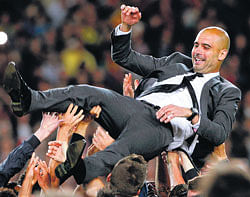
The chase is over. Pep Guardiola, the most courted soccer coach on earth, is not going to Chelsea, nor to Manchester City, nor even to the national team of Brazil. He is going to Germany.
Bayern Munich wrong-footed every rival in the sport when it announced last week that the Catalan would be its new team trainer starting in July. The Bavarians’ incumbent coach, the 67-year-old Jupp Heynckes, had told the board late last year that he would retire after this season.
Guardiola was contacted in New York. He is on leave, taking time out with his wife and daughters, improving his English and indulging his mind with some extramural studies at Columbia University.
He let it be known that he was ready for the next step in his coaching career after Barcelona. But he was keeping his options close to his chest.
The Russian owner of Chelsea, Roman Abramovich, had courted Guardiola for almost two years, effectively asking the coach to name his own price.
Manchester City’s owners in Abu Dhabi had neither encouraged nor discouraged newspaper speculation which, as late as last Wednesday morning, splashed headlines suggesting that Guardiola had secretly signed a contract worth 10 million pounds, or $16 million, a year.
Brazil had toyed with the rumors of Guardiola becoming its national coach in December. France had feasted on stories that he would take over at Paris Saint-Germain. And Manchester United’s name was linked to Guardiola’s in dispatches.
The more he distanced himself from his game, the more wanted he became. What all these Goliaths of soccer coveted was the success that Guardiola had achieved. His four years in charge of Barcelona reaped 14 trophies in the 16 tournaments available to it.
More than that, much more, is the style of the man and the team he was associated with. Barca — his club as a boy, as a player and as a coach — has simply reached a plateau of flair and triumph that no other team is close to.And that style is not exclusive to Barca, but to the national team of Spain, because the imprint of the Catalan team is written right through the squad that has dominated world soccer these past four years.
There lie the tantalising questions. Was Guardiola the beneficiary of Barcelona’s talent pool, or the leader of it? Can it be translated and transported abroad? Is Germany, even the richest of German clubs, able to buy into Barca and adapt its compelling effectiveness? Time will tell.
Time is the factor that Chelsea’s Abramovich fails to acknowledge with his impatient hiring and firing of coaches on a seasonal basis. And time – and stability – is the enormous commitment that Munich offered to Guardiola.
Of course it is no Barcelona. Bayern has a reasonable record of nurturing young players, but nobody can replicate the Barca school that, over 30 years, has imbued in kids as young as 11 the love of its style and the ability to pass, to move and to anticipate one another’s movements.
Lionel Messi, Xavi Hernandez, Andres Iniesta and the rest can play blind, almost literally if they had to. Guardiola came through that system when Johan Cruyff was head coach and mentor. Guardiola’s erstwhile assistant, Tito Vilanova, has seamlessly taken over the mantle and, despite his recurrence of throat cancer, made an even better start with the team than Guardiola managed.
It is talent. It is lifelong habit. It is intense and draining to sustain.
Guardiola will inherit a team that Heynckes has set up. That team is nine points clear in the Bundesliga at the moment, and the core of it was good enough to reach two of the last three Champions League finals – though it could not win either time.
Its backbone is German, from the goalie Manuel Neuer through the captain Philip Lahm, the midfield warrior Bastian Schweinsteiger to the striker Mario Gomez.
Its has two of Germany’s brightest creative talents, Toni Kroos and Thomas Muller.
Its wingers, Franck Ribery and Arjen Robben, can certainly play ‘Guardiola’ soccer.
Its overseas stars include the Brazilians Rafinha, Dante and Gustavo, as well as the Peruvian Claudio Pizarro. And one special Spaniard, Javi Martinez, for whom Bayern paid 40 million euros, or $53 million, last summer.
Language will not be a problem. Almost all of Europe’s top clubs these days field multinational sides, and Bayern’s leaders in the board room are excellent linguists.
They are also, like Guardiola, converts from the field of play. Karl-Heinz Rummenigge, the chief executive of Bayern, was a striker of high class and is currently the leader of the European club association and is trying to coordinate policy among them all.
Rummenigge’s goal is to position FC Bayern for the new UEFA financial rules intended to prohibit clubs from living beyond their means.
In that aspect, the Bundesliga is ahead of the game – and Bayern, its wealthiest club, means to be the leader in the new age of fiscal responsibility.
Guardiola has turned down greater financial inducements, certainly from Chelsea, to be part of this club. He probably will, one day, arrive in England’s Premier League. But that could be three years down the line – quite possibly at Manchester United if and when Alex Ferguson, now 71, decides to retire.
Meanwhile, Bayern has moved to challenge its own structure as well as to challenge Guardiola. ''This shows the value of Bayern, who want to be on par with the likes of Real Madrid or Manchester United,” Franz Beckenbauer said.
Beckenbauer has been everything at Bayern from its top player to its president. He added: ''Matthias Sammer and Pep Guardiola – you will not find a better duo anywhere.'' Sammer, another former player, is now the club’s sporting director. He is a German with an iron will in an organisation taking on the new vision imported from Barcelona.